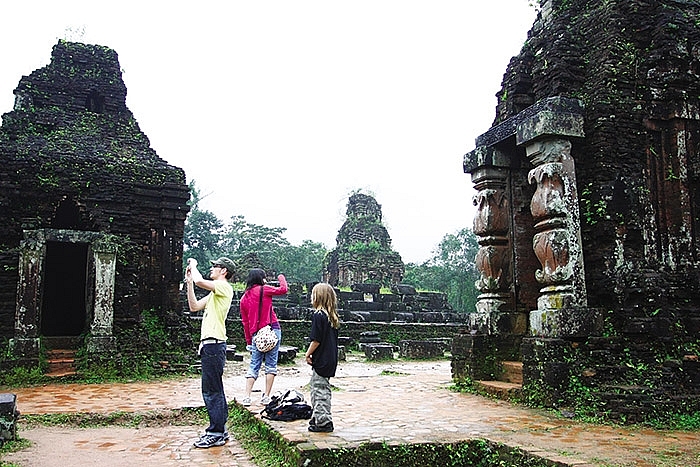Historical and cultural relic sites, pagodas, and temples are not only a destination for Vietnamese people. Throughout the country, these important sites also attract a great number of both international tourists and expatriates.

The One-Pillar Pagoda in Hanoi is an iconic Buddhist landmark
Phu Tay Ho Temple in Hanoi always attracts a lot of people at the beginning of the new year. In addition to the majority of Vietnamese people who make the trip, there are a large number of international visitors from Asian and European countries. They are usually tourists who want to experience spiritual events when coming to Vietnam. The rest are often made up of those who have lived and studied Vietnamese cultural practices and can speak the language. In addition to offering incense, they also learn to worship and pray for happiness, prosperity, and good health for their family.
Pagodas in the capital such as Tran Quoc and Quan Su, as well as Quan Thanh and Phu Tay Ho temples, are located near popular expat districts and often become spiritual spots for many non-Vietnamese people.
In addition to praying for health and peace, many foreigners also come to pray for luck in love. Nguyen Lan Chi, who for more than a decade has sold worship offerings, souvenirs, and fruit at Ha Pagoda in Hanoi’s Cau Giay district, said, “There are visitors who come to my shop and write a note of their wish in English, and we accept them, but I did not know much English. I often asked my son, who studies at a language school, to translate and rewrite them. They like the place very much and always say thank you.”
The ancient town of Hoi An is a top destination for tourists wandering through Vietnam. Of its many pagodas and shrines, Ong Pagoda is a particular favourite. Entering Ong Pagoda on the 8th day of the Lunar New Year, John Mikery, a German tourist visiting for the first time, was surprised to see so many Vietnamese people flocking to the temple to pray for good fortune in the year ahead. “Vietnamese people seem quite religious and I feel that the peace reflected by Buddhism is what we all desire for the future,” he said.
Spiritual tourism for visitors

Both travellers and expats take time out to explore cultural sites

As Vietnam’s tourism booms, more and more curious visitors flock to the country’s colourful and traditional sites in towns and cities
In recent years, more and more foreign groups wish to explore sacred places in Vietnam. Spiritual tours for domestic visitors have also been developed, and travel companies offer trips to sacred places for tourists. Most are extremely excited when immersed in the flow of people at these peaceful and solemn places.
Tour guide Ha Van Huong said that on one occasion of leading a delegation of American guests to Ngoc Hoang Pagoda in Ho Chi Minh City, where former US president Barack Obama had visited, many guests were surprised to hear about Vietnamese beliefs and kept asking more. “They asked me if the temples in Ho Chi Minh City were crowded on regular days. They were curious about the beliefs of Vietnamese people,” Huong shared.
In order to serve a group of high-spending travellers, some local and international hotels and resorts are gradually built in the style of spiritual tourist destinations in Vietnam, of which the most recent is Legacy Yen Tu in the foot of sarced Yen Tu Mountain in the northern province of Quang Ninh. Legacy Yen Tu creates a place where visitors can participate in meditation classes and learn about hundreds of years of Vietnamese and Buddhist history.
Despite this rich spiritual tourism potential, with 15,000 temples and more than 8,000 festivals each year, many experts believe that this area mainly attracts only Vietnamese tourists, with the number of foreign tourists participating in these types of tours still limited.
Statistics from the Vietnam National Administration of Tourism in 2013 showed that only 12 per cent of international visitors bought tours to religious places such as historical and cultural relic sites, temples, and pagodas. However the trend is changing today, travellers increasingly seek authenticity. According to reports of Tripadvisor and BCG, the fastest growing experience category in total booking counts in global travellers belongs to historical and heritage tours which count for 125 per cent YOY growth of 2016-2017 period.
Nguyen Phuong, a representative from Custom Vietnam Travel, said that overseas visitors often want to find information about the beliefs of local people, not to participate in ceremonies or perform detailed rituals like local people do. Therefore, the presentational content of tour guides plays a very important role. In addition to existing spiritual elements, service and environmental factors must also be guaranteed in order for this type of tourism to attract more foreign visitors.
“We don’t spend the whole tour just visiting temples, but combine this with other activities. When visiting Huong Pagoda, we also offer activities such as sailing and cable car rides. At Bai Dinh Pagoda in Ninh Binh, visitors can go to Van Long Nature Reserve, Trang An, and Tam Coc. Programmes must be flexible and contain plenty of choice to attract tourists,” said Phuong.
VIR